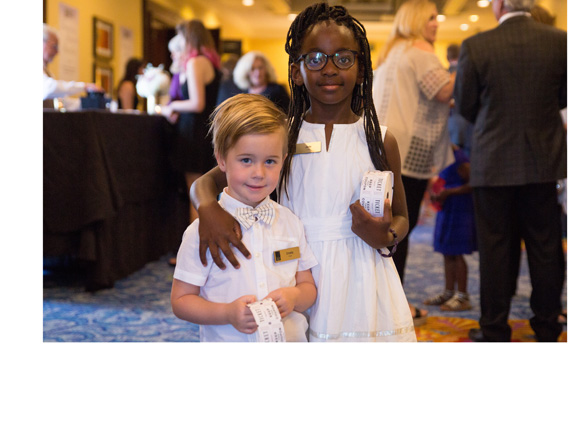If you look at the number of kids in foster care in San Diego County, there are 3,000 to 3,500 total and 40 percent of them are under the age of 5-years-old. These are kids that cannot talk or advocate for themselves.
It is that whole nature vs. nurture. What is seen here is that nature has done its course in bringing the child into the world, but the nurturing or the environment that they are placed in has such a huge impact in the first three years.
If you look at the number of kids in foster care in San Diego County, there are 3,000 to 3,500 total and 40 percent of them are under the age of 5-years-old. These are kids that cannot talk or advocate for themselves.
It is that whole nature vs. nurture. What is seen here is that nature has done its course in bringing the child into the world, but the nurturing or the environment that they are placed in has such a huge impact in the first three years.
“I’ve seen kids come into our care where doctors said that there was no way this child was going to live, no way this child will have any kind of life. But just by putting them into a stable environment with a constant routine, constant love and attention they turn around,” said Angels Foster Family Network Executive Director Jeff Wiemann.
Wiemann said Angels has about 66 kids that it is caring for now. With 15 staff members it has about 70 active families right now, approximately 25 families that are in the pipeline to be a resource family and it could easily handle another 80 more families.
“That is the challenge we face right now, not enough families to match the kids in need,” he said. “It’s not that there is not enough families in San Diego, it is families that know that there is this need out there and that would step up and volunteer. Last year we had to turn away 129 kids offered to us by the County but we did not have homes available. Half of those 129 were sibling sets that needed to stay together.”
Before Wiemann came to Angels as the executive director he fostered through Angels. Living in La Mesa, his wife and he had four kids and decided they wanted more, but at some stage age takes over, he said.
“But we still had love in our hearts, we wanted to give back and we found fostering. It was four years ago April that my wife was at Angels going through an information session. And that began our journey,” he said.
By July 2013 the Wiemann’s had a 6-week baby boy and it was an amazing, heartwarming, hurtful experience with a full range of emotions.
“We completely underestimated the impact it would have in a positive way it would have on the kids, on being mentors to our foster son’s family,” he said. “It was a whole litany of stories. We are still very close to our foster son and we still see him every couple of weeks. We are very close to his dad. His dad doesn’t have rights as a father. His mom, the foster child’s grandmother adopted him. His dad is still in jail and he calls me about once a week. We are still playing a mentor role, still guiding him. What we saw when we met him was just his undying love for his child. We didn’t worry about his past or any mistakes that he had made, we just saw how caring and loving he was with his child. We learned later that it came from him losing his dad at around the age of 12. He didn’t have a father figure so he wanted to be that father figure. He’s been a great dad in spite of being incarcerated for the majority of his son’s life.”
Wiemann said they went through the whole experience and had their foster son for about four months before handing him over to his grandmother.
“Even though we felt our hearts grow having a foster child, when he left it hurt a lot,” he said. “It still hurts today. At the same time as our hearts swells up and fills up, that loss, the heart doesn’t empty. It stays big like that and looks for the next child you can love on. That’s why I refer to it as that ‘disease’ as people keep doing it and looking for another child to help.”
Wiemann said foster parents take it on because they know what we are doing for that child. He said looking at their foster child today at 4-years-old they could see themselves in him and the gift that they gave him of stability and love.
“He is loved by his grandmother and he is doing great,” he said. “About six months ago he called us mom and dad for the first time. We never said that around him but his grandma told him he can have more than one mom and dad and he realizes that. Now he has all of these caring adults in his life. What a better thing than that for a kid to know? Especially given his start.”
About that same time, Angels was looking for an interim executive director. Wiemann has run other organizations, non-profit organizations, so he put my hat in the ring and they picked him. By June of the next year he became the permanent executive director. This fall Wiemann will have been there four years.
“Angels is unique,” he said. “Kids come into care from 1-day old to age 5.”
Angels has been around for 18 years founded by Cathy Richmon who lives in Mt. Helix. She was a court appointed special advocate and she saw that all of these young kids were being bounced from home to home. Angels still sees some of this today where people think that they are just babies, they are fine and we can move them around. Research shows that every time you move that child it causes huge trauma. If that child is moved so many times that it does not form at least one healthy attachment with an adult in the first three years of its life, then their brain wires differently. Later in life they have higher instances of anxiety, depression and other mental illnesses because they do not know how to trust and bond with another human being. What Cathy saw in older foster kids is that they were causing problems in foster care and she realized that when you peel back the onion in each one of those cases, you can trace it back most often to when they were young.
Wiemann said in their case, their foster son came in and he was ashen white. His ethnic background was Asian so he should have had a darker olive tone.
“When we picked him up I looked down at his face and I reached down and touched his hand. It was not only cold—it was frigid,” he said. “We took him home and held him and loved on him. In the first few weeks, he didn’t cry, didn’t coo, and didn’t do anything other than a deer in the headlights look.”
The training provided at Angels teaches all of the parents trauma reform care. Wiemann said he is not a clinician, or a social worker. He is a dad and businessperson. What trauma reform care is, is to stand back and try to connect the dots, he said. Why is the child doing this or reacting this way? And then trying out to find out what could be the cause.
“In our foster sons case, in the first six weeks of his life, his needs never got met,” he said. “So anytime he cried or expended energy to let them know what he needed, he didn’t get it. He was in survival mode. He was under weight, delayed developmentally and on a path to ruin. In the four and a half months he was with us he caught up with his emotional and developmental setbacks. Within four weeks he began crying, cooing and doing everything that a normal child should be at that age. And that is one of the amazing things about kids 5 and under is how quickly they turn around. It shows how resilient they are.”
Angels sees this type of situation every day and it is sometimes difficult to see the kids that come into its care that have been traumatized like that. That’s why Angels was founded and why it focuses on ages 5 and under. Nobody else was doing and it was a crisis. “It still is a crisis,” said Wiemann.
When you pick up a child that young in foster care, most of the time you have to figure out the problems with the child alone. When you go to the doctor, unless you have access to the biological parents, you have no history. There are also many times when there are cultural preferences, so having contact with the biological family is essential. He said this is just one of the many problems that foster parents face every day in dealing with foster children, but the support network that Angels has built over the years helps foster families, the biological family and the County system to come together and do what is right for each young child. But the need is greater than the resources that Angels has when it comes to the availability of foster parents.
“Here is some food for thought,” said Wiemann. “If every single civic organization in San Diego County, the rotaries, optimists, veterans centers, all of them had just one family that would foster, and that organization would wrap themselves around that family as support, we’d have more than enough people to take care of these foster infants and toddlers. It just takes one family and a group of people to support them. Because I lead this organization, the hardest thing that we face is that I cannot foster from this county. It would mean a child up for adoption. We are up for adoption but that is not our primary goal here. Our goal is to get the children back to their biological family. But we already know we have many retirees in the community who have the time, have the means to do this. Why not? Why not help a couple of kids?”
Television had portrayed foster parents as couples stacking kids for the money, said Wiemann. In traditional foster care you can have up to six kids in your home. Purely because there are so many foster care kids in need. Angel’s focus is on one child or sibling set at a time so that children at this young age can get the care and attention that they need. All of the families that foster with Angels commit to the stability and care of the child until the court or County decide otherwise. It is Angels’ goal to get these children back with their biological families.
“One of the things that drew my wife and me to Angels is that Angels accepts all if you have a love of children and want to help out,” he said. “Angels accepts single parents, same sex couples, retirees, dual income professional couples, stay at home parents and every type of family in between. About 20 percent of our families are either active duty or veterans. With military training teaching you to deal with chaos and uncertainness, that is pretty much foster care right there. Military people know how to deal with that.”
Feeling at home is a culture that Angels has cultivated. Wiemann said imagine when foster parents of various backgrounds come together of all political, religious preferences, and everything else. When they come together it is the same thing. They know what you are going through and they have done it themselves, he said. It is not just a collection of foster parents that are doing this individually, it is actually a community of people that all support each other and are there for each other.
“If somebody is having a bad day or a crisis, there are enough people between our staff and the foster parent community for them to turn to for help. Our folks around here rally around them. Everybody is here to make sure the family can take care of the kids,” he said. “We try and get the foster families together as much as possible. You’ll see about 50 at our annual Gala, with the use of grants. Every summer we hold a family picnic and get as many of our foster families together and we do the same with a holiday in December. The office at Angels has a playroom that is used for play dates between foster families, meetings with biological parents and family and it is designed so that the adults are down at the child’s level for the best interaction. Foster families meeting here for a play date or just to talk to each other is always happening here.”
Wiemann said what concerns him and Angels today the most is the number of kids it turns away. People ask where do those kids go and the answer is they go into traditional foster care. It is not bad, but it is not the quality of care that these infants and toddlers need.
“The other thing of great concern is the opioid epidemic. If you look in many places in America you see that it is heroin laced with fentanyl,” he said. “Here the drug of choice is methamphetamine so we get a lot of kids exposed to that. The good thing about meth is it is in quick and out quick. But opioids are making its way into this county. So look down the road a few years and you get the picture. There is no lines of economic or social status for this epidemic and our foster parents have compassion when drugs are involved in the biological families. They understand that it could happen to anyone. Many receiving infants have to deal with the withdrawals of a baby born addicted to both illegal and prescription drugs.”
Wiemann said the annual Gala is one of the major fundraisers for us to be able to recruit and maintain foster parents and continue its services to the infant to toddler foster care program
About the Gala
“Putting on the Ritz for Infants and Toddlers in Foster Care”
May is National Foster Care Month and Angels Foster Family Network is pleased to announce its annual gala the evening of May 12 at the U.S. Grant Hotel downtown. Supporters of the nonprofit organization will don their flapper dresses and bowties as they dance the Charleston at the “Putting on the Ritz” 1920s-style gala.
The goal: To raise $340,000 to support the organization’s work creating stable, loving homes for infants and toddlers in foster care throughout San Diego County.
Founded in 1998, Angels Foster Family Network has a unique and successful approach to fostering infants and toddlers. Unlike traditional foster care, Angels’ places only one child or sibling set with each of their families and provides round-the-clock support ensuring everyone receives the best support and care possible. In return, the family willingly commits to the stable care of each child placed with them until they reunify with their biologic parent(s) or are adopted. This approach ensures every child receives the individualized attention they need and deserve without the harmful effects of being shuffled between several different foster homes.
Thanks to event sponsors, a large number of the nearly 70 current Angels foster families will be hosted at the event and recognized for the incredible contributions they make in the lives of young children. Also, and in conjunction with Military Spouse Appreciation Day (May 12), U.S. Navy Chief Johnathon Stone will be recognized on behalf of his late wife, Sarah Stone, who passed way last October. The Stone family fostered with Angels and remains deeply dedicated to the organization and its mission. One of Sarah’s last requests was that the family stay involved with the agency that offered them the opportunity to foster – then adopt – their son, Jackson.
About Angels. Angels is a 501(c)(3) Charity / Foster Family Agency (FFA) licensed by the State of California whose mission is to passionately and collaborative care for children five and younger with diverse and exceptional families who dedicate themselves to each child’s wellbeing. www.angelsfoster.org













